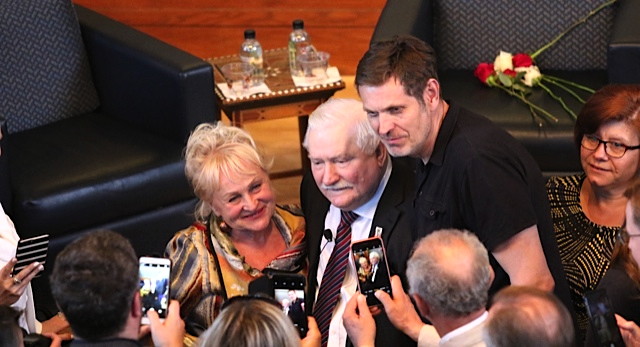The line began to form toward the back of McCosh 50, a lecture hall at Princeton University, where people waited April 23 to meet and get their picture taken with the man in the dark suit and white mustache standing at the front of the auditorium.
Lech Walesa, the union leader turned Nobel-prize winner and president of Poland who helped guide his native country out of communism to democracy, had just finished speaking from inside the same hall where Albert Einstein and other distinguished guests have been coming for more than 100 years. Through an interpreter, he reflected on the past, the need for American leadership in the world and his legacy.
“I don’t care about that,” the 74-year-old said when asked how he wanted to be remembered, in a remark that got a laugh and applause from the audience.
He mixed the serious with the humorous. He said America, as the globe’s only superpower, has a “special responsibility for this world.”
“Tell me, do you want to lead the world? If not, give the leadership to Poland and we will know what to do with” it, he said.
He said the United States needed to lead with “ideas for the world.”
“Until today, no other generation had so many opportunities and such a chance as we have,” he said. “We have a chance … for peace, for wealth-building, prosperity. But we have to make reforms.”
Recalling the Poland he grew up in, he said that after World War II, the Soviet Union had imposed a political and economic system on the country. Polish armed resistance, in the 1940s and 1950s, was crushed, he said.
He said that in later decades, “we organized strikes … and we took to the streets.” That, too, he said, was crushed.
“So through this road of taking action … we had to figure out how to proceed in order to get ahead, to win,” he said. “Every attempt to unify the society was annihilated, was broken. And we couldn’t get together. We couldn’t unite.”
He recalled the election of the first Polish pope, John Paul II, and his subsequent visit to his home country, in 1979. Walesa said nearly the entire country came out to meet him, even communists, whom he joked, met with the pope and learned to make the sign of the cross.
“They didn’t learn the proper words, they were saying one, two, three,” he said.
He said he had brought up the history of no one giving his country a chance of being free, “because, today, people say we are not going to be able to succeed with the European unity and later with globalization.”
He said he tells the skeptics that they were wrong in the past.
Of himself, he said he “was not planning to be a leader,” and that people had thought little of him given his humble background.
“But I had two things,” he said. “The faith in God and faith in what I believe.”
He was president of Poland from 1990-95 and then lost his re-election campaign.
In looking back, he said he had put “a democracy in motion, organized parties, which then defeated me.”
“But I was very happy,” he said, “because I put the political system on the right rail.”

